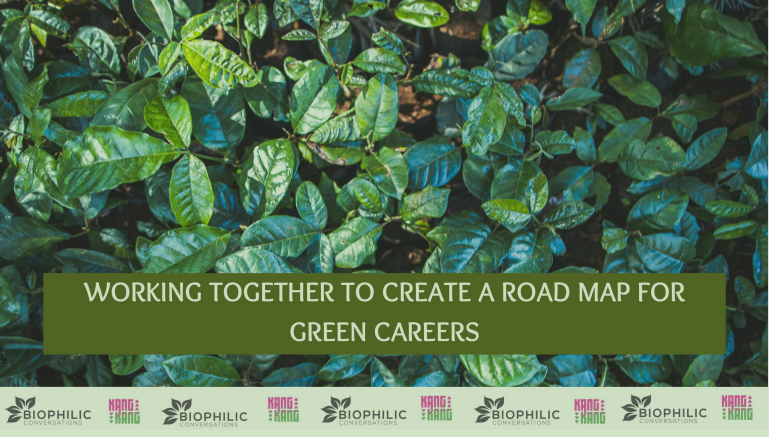
Background
Today, 70 percent of the population in sub-Saharan Africa is under the age of 30. With natural resources in the African continent facing threats such as habitat loss, climate change, pollution and degradation of the natural environment, it is crucial to involve the youth to safeguard the future of people and the planet.
There is a need to continue and reinforce discussions on sustainable development, the green economy and the circular economy as the youth employment crisis becomes a key concept in developing countries. Unleashing the potential of young women and men as drivers of environmental conservation is not only desirable but critical for not only job creation and the economy but also sustainable development.
Kang4Nature and Biophilic Conversations, both youth-led organisations based in Kenya have a combined experience of over five years in engaging and involving the youth in Kenya in environmental conservation activities. Many youths were interested in joining conservation careers as we engaged them in universities across Kenya. With passion and optimism, they asked; how can we help? How can we be part of the solution? How can we begin a career in conservation? These questions kept coming up in every university we visited. This made us notice the growing disconnect between the workplace and what is being taught in schools in Environmental, Wildlife, and Natural Science courses.
This prompted Kang4Nature to conduct research to see how we can bridge this gap. We sent questionnaires to 1210 students across 15 universities in Kenya. It was amazing to learn that 85% of the students indicated passion as their primary source of choosing their course. These numbers are great but only if you stop there. We dug further and found that more than 73% of students did not have any exposure to a potential employee or individual having a career in their course. 62% of the students had no idea what they will do or where they will work. 75% of graduands end up changing their careers from green careers to other promising careers. This has led to Environmental Science becoming the least marketable course in Kenya.
The Summit Objective
The research showed exposure as one of the most important things to help bridge the gap between students and their workplaces. That’s why we have joined forces to host the first-ever Green Careers Summit. A link that will create a road map for careers in Environmental conservation and natural sciences. The summit will be a full-day event held on Saturday, 11 February 2022.
The Green Careers Summit is a chance for stakeholders and innovators in green technology to share the opportunities available for the youth in environmental conservation and also support ideas by the youth for the sustainability of natural resources. It will be one of a kind experience to bridge the gap between the youth and the green economy industry players.
The Green Careers Summit aims to provide a platform for stakeholders involved in environmental conservation, wildlife management, tourism management, natural resource management, clean energy, environmental and wildlife law, wildlife veterinary, conservation storytelling and related options to share experiences, innovations, and opportunities for scaled action. The transition to a secure and sustainable future for all requires unprecedented shifts in the global green jobs sector.
The event programme will cover two main themes:
Promoting an enabling environment for the youth
Facilitating access to opportunities, networks, knowledge and skills for the youth
The event will involve:
Stakeholder sessions to engage in technical discussions through panel discussions.
Speed networking for the youth
Marketplace for stakeholders.
Career talks from the youth.
Training sessions from organisations and partners.
The event is expected to:
Pledge from stakeholders to commit to being transparent and accountable in providing opportunities for the youth.
Double opportunities for young people in the green careers space in research, implementation and advocacy.
Creating a clear pathway to getting a green career between the youth and stakeholders.
Exchange knowledge and lessons learned and best practices to involve youth in safeguarding the planet.
Identify the correlations between green careers and the role of stakeholders in supporting the youth.
About Kang4Nature
We are a group of like-minded youth with a vision to make Kenya the SI unit of conservation in the world. We understand we can’t do it alone, that’s why we aim to create a network for youth support and cooperation, to leave our environment better for ourselves and wildlife. Our goal is to create Leaders who will ensure they create a ripple effect in their institutions through the #TupendeMazingira program.
We work as an implementing agency through partnerships with other conservation-oriented organizations in Kenya. We are currently working with Kenya Wildlife Service and Friends of Karura Forest to participate in the reafforestation and general ecosystem restoration of Nairobi National Park and Karura Forest respectively. These programs are meant to create opportunities for the youth to practise their passion.
The youth are often brought in as marginalized groups (women, youth, indigenous people, and persons with disability). This is ridiculous given that the youth comprise 70 percent of the population in Africa. We aim to empower more youth to take their spaces as active players in the conservation of our environment and wildlife.
About Biophilic Conversations
Biophilic Conversations is a youth-led organisation that is empowering young people in Africa towards careers that are environmental conservation related. The platform allows young Kenyans to share conservation stories from science to policy to education to community conservation.
Our goal is to bring young people from the local conservation community together to inspire and engage each other on nature and wildlife and why we need to work together to protect and conserve natural resources for present and future generations. They also provoke discussion about conservation successes and challenges in Kenya and Africa and how young people can be involved in conservation. The organisation also hosts conservation talks and events and shares jobs, internships, volunteer opportunities, calls for awards, recognition, fellowships, conferences, and courses around the world around but not limited to environmental conservation.
Biophilic Conversation is affiliated with the Tony Wild Foundation – a photo-led platform for sharing stories that enable relevant knowledge sharing of everything nature and wildlife, and Nyika Silika – an advocacy and awareness creation platform, educating the public, especially the youth in Kenya, on how we are a part of nature and the need to safeguard our planet.

